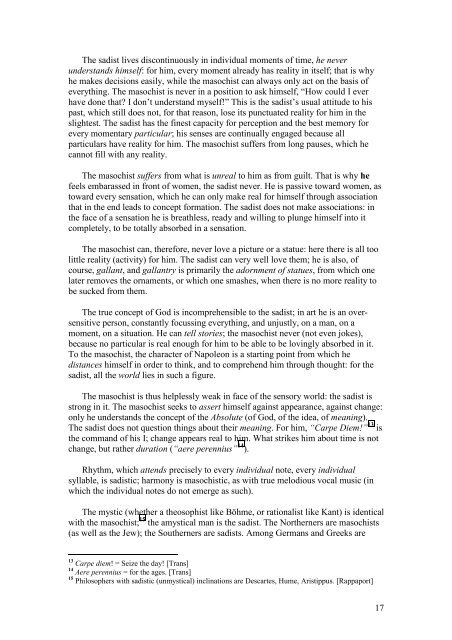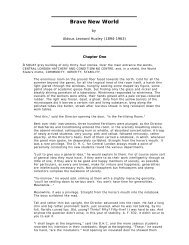Aphoristic Writings, Notebook, and Letters to a Friend, by Otto ...
Aphoristic Writings, Notebook, and Letters to a Friend, by Otto ...
Aphoristic Writings, Notebook, and Letters to a Friend, by Otto ...
Create successful ePaper yourself
Turn your PDF publications into a flip-book with our unique Google optimized e-Paper software.
The sadist lives discontinuously in individual moments of time, he never<br />
underst<strong>and</strong>s himself: for him, every moment already has reality in itself; that is why<br />
he makes decisions easily, while the masochist can always only act on the basis of<br />
everything. The masochist is never in a position <strong>to</strong> ask himself, “How could I ever<br />
have done that? I don’t underst<strong>and</strong> myself!” This is the sadist’s usual attitude <strong>to</strong> his<br />
past, which still does not, for that reason, lose its punctuated reality for him in the<br />
slightest. The sadist has the finest capacity for perception <strong>and</strong> the best memory for<br />
every momentary particular; his senses are continually engaged because all<br />
particulars have reality for him. The masochist suffers from long pauses, which he<br />
cannot fill with any reality.<br />
The masochist suffers from what is unreal <strong>to</strong> him as from guilt. That is why he<br />
feels embarassed in front of women, the sadist never. He is passive <strong>to</strong>ward women, as<br />
<strong>to</strong>ward every sensation, which he can only make real for himself through association<br />
that in the end leads <strong>to</strong> concept formation. The sadist does not make associations: in<br />
the face of a sensation he is breathless, ready <strong>and</strong> willing <strong>to</strong> plunge himself in<strong>to</strong> it<br />
completely, <strong>to</strong> be <strong>to</strong>tally absorbed in a sensation.<br />
The masochist can, therefore, never love a picture or a statue: here there is all <strong>to</strong>o<br />
little reality (activity) for him. The sadist can very well love them; he is also, of<br />
course, gallant, <strong>and</strong> gallantry is primarily the adornment of statues, from which one<br />
later removes the ornaments, or which one smashes, when there is no more reality <strong>to</strong><br />
be sucked from them.<br />
The true concept of God is incomprehensible <strong>to</strong> the sadist; in art he is an oversensitive<br />
person, constantly focussing everything, <strong>and</strong> unjustly, on a man, on a<br />
moment, on a situation. He can tell s<strong>to</strong>ries; the masochist never (not even jokes),<br />
because no particular is real enough for him <strong>to</strong> be able <strong>to</strong> be lovingly absorbed in it.<br />
To the masochist, the character of Napoleon is a starting point from which he<br />
distances himself in order <strong>to</strong> think, <strong>and</strong> <strong>to</strong> comprehend him through thought: for the<br />
sadist, all the world lies in such a figure.<br />
The masochist is thus helplessly weak in face of the sensory world: the sadist is<br />
strong in it. The masochist seeks <strong>to</strong> assert himself against appearance, against change:<br />
only he underst<strong>and</strong>s the concept of the Absolute (of God, of the idea, of meaning).<br />
The sadist does not question things about their meaning. For him, “Carpe Diem!” 13 is<br />
the comm<strong>and</strong> of his I; change appears real <strong>to</strong> him. What strikes him about time is not<br />
change, but rather duration (“aere perennius” 14 ).<br />
Rhythm, which attends precisely <strong>to</strong> every individual note, every individual<br />
syllable, is sadistic; harmony is masochistic, as with true melodious vocal music (in<br />
which the individual notes do not emerge as such).<br />
The mystic (whether a theosophist like Böhme, or rationalist like Kant) is identical<br />
with the masochist; 15 the amystical man is the sadist. The Northerners are masochists<br />
(as well as the Jew); the Southerners are sadists. Among Germans <strong>and</strong> Greeks are<br />
13 Carpe diem! = Seize the day! [Trans]<br />
14 Aere perennius = for the ages. [Trans]<br />
15 Philosophers with sadistic (unmystical) inclinations are Descartes, Hume, Aristippus. [Rappaport]<br />
17







